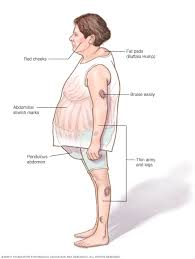Cushing Syndrome: Causes, Symptoms, Diagnosis, and Treatment
Cushing syndrome is a rare but serious medical condition caused by an excess of cortisol, a hormone produced by the adrenal glands. Cortisol plays a crucial role in various body functions, including regulating metabolism, blood sugar, and the body’s response to stress. When there is too much cortisol in the body, it can lead to a wide range of symptoms, affecting multiple systems and organs. In this article, we will explore the causes, symptoms, diagnosis, and treatment options for Cushing syndrome, shedding light on how this condition affects individuals and how it can be managed.
What is Cushing Syndrome?
Cushing syndrome refers to the group of symptoms and health issues caused by prolonged exposure to high levels of cortisol. The condition can develop due to several reasons, most commonly from the use of corticosteroid medications, which are synthetic versions of cortisol. However, Cushing syndrome can also result from tumors or other conditions that cause the body to produce too much cortisol.
Cortisol is essential for managing inflammation, regulating blood pressure, and supporting the immune system. While it is necessary for normal bodily function, excessive cortisol can lead to various disruptions in the body.
Causes of Cushing Syndrome
There are two primary causes of Cushing syndrome: exogenous and endogenous.
Exogenous Cushing Syndrome
The most common cause of Cushing syndrome is the prolonged use of corticosteroid medications, which are often prescribed for conditions like asthma, rheumatoid arthritis, or lupus. These medications mimic the effects of cortisol and, when used for extended periods or in high doses, can cause the body to accumulate excessive cortisol.
Endogenous Cushing Syndrome
In endogenous Cushing syndrome, the body produces too much cortisol on its own. The two main types of endogenous causes are:
Pituitary Tumors (Cushing Disease): The most common endogenous cause is a benign tumor in the pituitary gland called an adenoma. This tumor secretes adrenocorticotropic hormone (ACTH), which stimulates the adrenal glands to produce excess cortisol.
Adrenal Tumors: Tumors in the adrenal glands can also cause the glands to produce excess cortisol, leading to Cushing syndrome. These tumors may be benign or malignant, but benign adrenal adenomas are the most common cause.
Ectopic ACTH Syndrome: In some rare cases, tumors outside the pituitary or adrenal glands can produce ACTH, which in turn leads to increased cortisol production. These tumors are typically found in the lungs or pancreas.
Symptoms of Cushing Syndrome
Cushing syndrome affects many systems in the body, and its symptoms can vary widely. Common signs include:
Weight Gain: One of the hallmark symptoms is rapid weight gain, especially around the face, neck, and abdomen, with thinning of the arms and legs.
Moon Face: A rounded, puffy face, known as “moon face,” is a characteristic feature of Cushing syndrome.
Buffalo Hump: Fat accumulation at the back of the neck, giving it a “buffalo hump,” is another distinctive feature.
Skin Changes: Skin becomes thin and fragile, leading to easy bruising, striae (purple stretch marks), and slow wound healing.
Muscle Weakness: Muscles, especially in the upper arms and thighs, can become weak and atrophied.
Bone Health: The excess cortisol can weaken bones, leading to osteoporosis and an increased risk of fractures.
High Blood Pressure: High cortisol levels can lead to elevated blood pressure, which may be difficult to control with medications.
Mood Changes: Individuals with Cushing syndrome may experience mood swings, anxiety, depression, or irritability.
Irregular Menstrual Cycles: In women, Cushing syndrome can cause irregular or absent periods and may lead to fertility problems.
Increased Risk of Infections: Since cortisol suppresses the immune system, individuals with Cushing syndrome are more susceptible to infections.
Diagnosing Cushing Syndrome
Diagnosing Cushing syndrome typically involves a combination of clinical evaluation, laboratory tests, and imaging studies. Since many of the symptoms overlap with other conditions, it can be challenging to make a definitive diagnosis based solely on physical examination. Common diagnostic methods include:
24-Hour Urinary Free Cortisol Test: This test measures the amount of cortisol excreted in the urine over a 24-hour period. High levels of cortisol in the urine may indicate Cushing syndrome.
Dexamethasone Suppression Test: This test involves administering a synthetic glucocorticoid (dexamethasone) and measuring cortisol levels in the blood. In healthy individuals, dexamethasone suppresses cortisol production, but this does not occur in those with Cushing syndrome.
Salivary Cortisol Test: Elevated nighttime salivary cortisol levels are often used as an indicator of Cushing syndrome.
ACTH Levels: Measuring ACTH levels in the blood can help determine whether the cause is a pituitary tumor or an adrenal tumor.
Imaging Studies: CT scans or MRIs may be used to identify tumors in the pituitary or adrenal glands, which are common causes of endogenous Cushing syndrome.
Treatment of Cushing Syndrome
The treatment approach for Cushing syndrome depends on the underlying cause of the condition.
Surgical Treatment: If the cause is a pituitary or adrenal tumor, surgery is often the most effective treatment. In the case of a pituitary tumor (Cushing disease), a surgeon may remove the tumor through the nose (transsphenoidal surgery). If the cause is an adrenal tumor, surgical removal of the adrenal gland may be necessary.
Medications: For cases where surgery is not an option or as adjunctive therapy, medications that block cortisol production (like ketoconazole or metyrapone) may be prescribed. In cases of Cushing disease, medications like pasireotide may help control ACTH production.
Radiation Therapy: If surgery is not successful or if a tumor cannot be completely removed, radiation therapy may be used to shrink the tumor.
Lifestyle Changes: Managing symptoms, such as high blood pressure, osteoporosis, and diabetes, may involve medications and lifestyle changes like diet modification and physical activity.
FAQs
What are the common symptoms of Cushing syndrome?
Cushing syndrome can cause a wide range of symptoms, including:
Weight Gain: Especially around the abdomen, face (moon face), and neck (buffalo hump).
Skin Changes: Thin skin, easy bruising, and purple stretch marks.
Muscle Weakness: Particularly in the arms and legs.
High Blood Pressure: Cortisol can increase blood pressure.
Mood Changes: Anxiety, depression, and irritability are common.
Bone Weakness: Long-term cortisol excess can lead to osteoporosis and an increased risk of fractures.
Irregular Menstrual Cycles: In women, periods may become irregular or stop altogether.
How is Cushing syndrome diagnosed?
Diagnosis of Cushing syndrome typically involves several tests:
Urinary Free Cortisol Test: Measures cortisol levels in urine over 24 hours.
Dexamethasone Suppression Test: Checks how cortisol levels respond to synthetic glucocorticoids.
Salivary Cortisol Test: Assesses cortisol levels, particularly at night.
Blood Tests: Measure ACTH levels to determine whether the excess cortisol is due to a pituitary or adrenal issue.
Imaging: CT or MRI scans help locate tumors in the pituitary or adrenal glands.
How is Cushing syndrome treated?
Treatment depends on the underlying cause of the condition:
Surgery: If the condition is due to a tumor, surgical removal of the tumor is often recommended.
Medications: Cortisol production can be controlled with medications like ketoconazole or metyrapone.
Radiation Therapy: If surgery is not fully successful, radiation may be used to shrink tumors.
Lifestyle Changes: Managing symptoms like high blood pressure, diabetes, and osteoporosis through medications and lifestyle modifications.
To Conclude
Cushing syndrome is a serious medical condition that requires prompt diagnosis and treatment to prevent complications. Understanding its causes, symptoms, and treatment options can help patients manage the condition and improve their quality of life. If you suspect you may have Cushing syndrome, it is important to seek medical attention for proper evaluation and management. Early diagnosis and targeted treatment can make a significant difference in the outcomes for individuals with this condition.
To read more, click here


